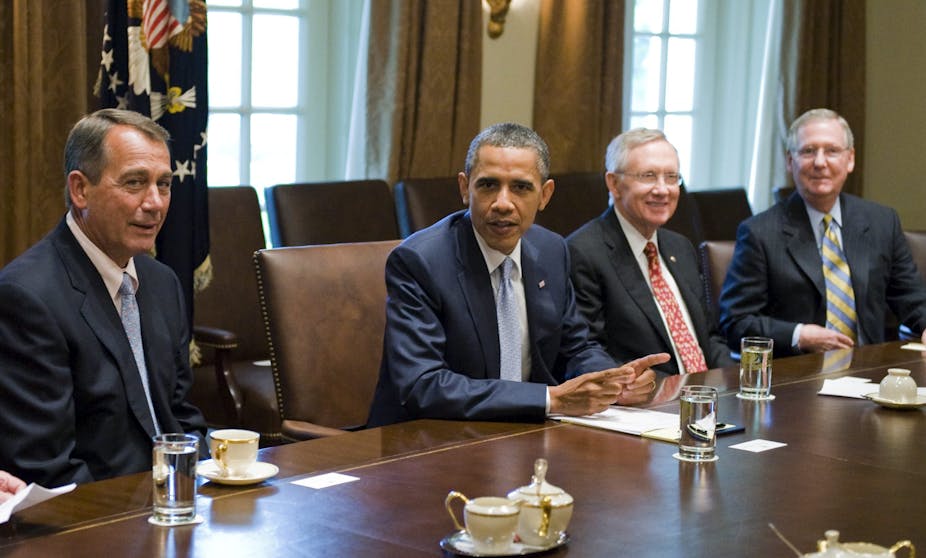International ratings agencies Moody’s and Standard & Poors have both indicated they would consider downgrading the US’s debt rating as negotiations aimed at raising the country’s statutory US$12.3 trillion debt limit – ensuring it does not default on its debt obligations – reportedly become increasingly heated. Meanwhile, the August 2 deadline looms.
How important is this move to place the US on downgrade watch by Moody’s this week and S&P today and what would be the implications of a downgrade?
The current debate tends to treat the American national debt as a huge problem. But America’s national debt is not just a problem for the US, it is also a key source of liquidity for the global economy – it’s really one of the pillars of global financial markets. Like the US dollar itself, US treasury bills also function as a pivot of the global economy.
The perfect ratings that are usually accorded to the US government are absolutely crucial in keeping the world economy going, and maintaining the liquidity of global financial markets. So if we were confronted with a downgrading of US debt it would have dramatic effects.
It’s hard to predict exactly what those effects would be beyond a general unravelling of financial positions. The closest metaphor is a fundamental deflation or implosion of the global economy.
Do you think US legislators will allow a default to happen by failing to raise the debt ceiling?
I think it is unlikely they will fail to raise the debt ceiling. There is still a certain degree of awareness that this (a default) can’t really happen, so my hunch is they will find ways to work around this.
Over the past few days Senate Minority Leader Mitch McConnell has come up with a plan that would allow Republicans to save face, allow for the raising of debt ceiling and push the issue basically down the line.
It seems to be a game of politics that has gotten out of hand. Even some American commentators that you wouldn’t expect it from have become very aggravated with the position the Republicans are taking.
For instance, conservative commentator David Brooks in the New York Times was expressing his annoyance with Republicans who had a really good deal but because they feel ideologically committed to this specific argument against any sort of tax increases, they refused to take what was on the table.
This impasse has unsettled global markets. US Federal Reserve chairman Ben Bernanke called for the issue to be resolved as quickly as possible. Will it do long-term damage?
It’s hard to say, but I think a lot of people are thinking like me, i.e. it looks bad now but they’ll probably be able to solve the situation somehow.
It seems too absurd to think that the American government would essentially sink its own economy. Most people including influential bankers and policy makers are working on that assumption. And if they do find a way to get around the problem, the consequences will be localised and fairly minimal.
The real threat is one of the market’s pillars like the US dollar or US Treasury bills just crumbling. The news of Moody’s now getting quite serious about re-grading America’s AAA debt rating makes people pay attention. Standard & Poor’s has added its voice.
People talk about default as if suddenly the US would default on all its debts, although that’s not exactly the problem – it’s more the sheer symbolism of the US not being able to make payments on however small a portion of its debts. It’s the fear that the credit of the US Treasury would no longer be worthy of absolute faith. That is the real danger.
I think it’s quite ironic and unfortunate that there is so much attention focused on the debt issue. It’s a distraction from real issues that are much more relevant to American workers and the state of the real economy around the world.
The problem is very well illustrated by quantitative easing (QE) programs. When Bernanke talks about growth being too slow and not generating enough employment, he’s definitely right – but it’s striking how little QE has done to address those problems.
Banks have been hoarding liquidity and, even though financial markets have resumed their pace of growth, it’s still very hard for ordinary people and businesses to get credit. That is the real issue.
A lot of these policies that the Federal Reserve has implemented have benefited Wall Street, but not really Main Street. The current debate is diverting attention from that problem to something that only has a very indirect relationship to the economic situation of ordinary people.
What’s your bet on the outcome?
I would say they will find a way to make those payments by August 2 – by brokering a compromise or by finding a way to raise the debt ceiling without the agreement of those Republicans unwilling to compromise.
But of course it may very well be they will just push the issue down the line so that in three months time (or whenever the significant date is), they will have the same problem.
It probably won’t explode right now, but the issue could be around for quite a while longer.

